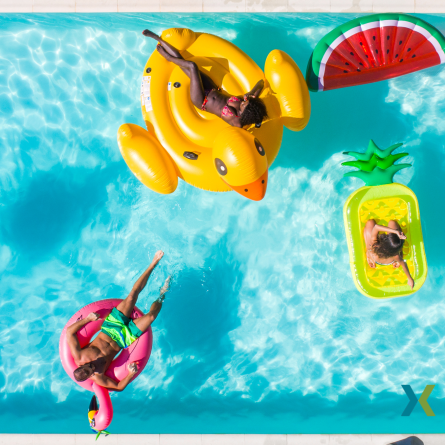As temperatures rise, many of us look forward to spending time in and around water. Whether it’s swimming in a pool, enjoying a day at the beach, or boating on a lake, water activities are a great way to stay active and have fun. However, it’s essential to prioritize safety to prevent drowning and other water-related injuries. At Next Level Urgent Care, we are committed to your safety and well-being. Here are crucial water safety tips to ensure your time in and around water is both enjoyable and safe.
Understanding the Risks
Drowning is a leading cause of accidental death, especially among children. Even strong swimmers can face dangers in the water, such as strong currents, sudden drop-offs, and unexpected medical emergencies. By understanding these risks and taking preventive measures, you can significantly reduce the chances of accidents.
General Water Safety Tips
- Learn to Swim
- Ensure that everyone in your family knows how to swim well. Enroll in swimming lessons if necessary.
- Teach children water survival skills, such as floating and treading water.
- Supervise Constantly
- Always keep a close watch on children and inexperienced swimmers. Never leave them unattended, even for a moment.
- Use the “touch supervision” method for young children, which means staying within arm’s reach at all times.
- Use Life Jackets
- Ensure everyone wears a properly fitting life jacket when boating, fishing, or participating in water sports taking place in open water.
- Use life jackets in pools or other bodies of water if swimmers are not strong or confident.
- Follow Pool Rules
- Obey posted pool rules and instructions from lifeguards.
- Avoid running on pool decks, diving in shallow water, and rough play.
- Install Barriers
- If you have a pool at home, install a fence with a self-closing, self-latching gate to prevent unsupervised access.
- Use pool covers and alarms for added safety.
- Be Prepared for Emergencies
- Learn CPR and basic first aid to respond promptly in case of an emergency.
- Keep a phone and emergency numbers nearby when swimming.
Tips for the Beach
- Swim Near Lifeguards
- Always swim in designated areas supervised by lifeguards.
- Follow the lifeguards’ instructions and heed any warnings or flags.
- Beware of Rip Currents
- Learn how to identify rip currents and what to do if caught in one.
- If caught in a rip current, stay calm, swim parallel to the shore until out of the current, and then swim back to shore.
- Check Weather Conditions
- Avoid swimming in harsh weather conditions or rough seas.
- Be cautious of sudden changes in weather and water conditions.
- Protect Your Skin
- Apply waterproof sunscreen to protect against harmful UV rays.
- Wear a hat and UV-protective clothing when spending extended periods in the sun.
Tips for Boating
- Wear Life Jackets
- Ensure all passengers wear a life jacket, regardless of swimming ability.
- Make sure life jackets are in good condition and fit properly.
- Follow Boating Rules
- Follow all local boating laws and regulations.
- Do not operate a boat under the influence of alcohol or drugs.
- Be Aware of Surroundings
- Keep an eye on the weather and return to shore if conditions become unfavorable.
- Be mindful of other boats, swimmers, and obstacles in the water.
- Have Safety Equipment
- Equip your boat with safety gear, including a first aid kit, fire extinguisher, signaling devices, and a radio.
Water Safety Tips for Children
- Enroll in Swimming Lessons
- Start swimming lessons early to build water confidence and skills in children.
- Use Floatation Devices
- Equip young children with floatation devices, but never rely on them alone for safety.
- Educate About Water Safety
- Teach children about the dangers of water and the importance of following safety rules.
- Stay Close
- Maintain close supervision, even if lifeguards are present.
What to Do in Case of a Water Emergency
- Call for Help
- Shout for help and call emergency services immediately.
- If a lifeguard is present, alert them to the situation.
- Reach or Throw, Don’t Go
- If someone is struggling in the water, use a long object to reach them or throw a floatation device.
- Avoid jumping in yourself unless you are trained in water rescue.
- Perform CPR
- If the person is unresponsive, call 911 and perform CPR until medical help arrives.
- Continue CPR until the person starts breathing or emergency personnel take over.
By following these water safety tips, you can enjoy your time in and around water while minimizing the risk of drowning and injuries. Stay vigilant, be prepared, and have a safe and fun-filled summer!
![NL Wordmark [Gradient] NL Wordmark [Gradient]](https://www.nextlevelurgentcare.com/wp-content/uploads/elementor/thumbs/NL-Wordmark-Gradient-7fm1iv6f0zylwqrxpy8kifrnrzsluqzzzofvqvs6smo.png)
